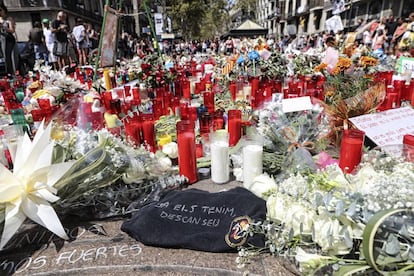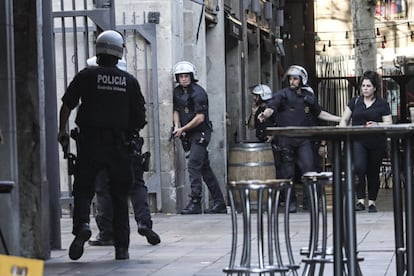Spanish prosecutors seek up to 41 years for perpetrators of 2017 Barcelona terrorist attacks
Islamist radicals killed 16 people and injured over 140 in the Catalan capital and Cambrils after several cell members died in an accidental blast while manipulating explosives

Spanish prosecutors are seeking a 41-year prison term for Mohammed Houli, the only surviving member of the terrorist cell that carried out attacks in Barcelona and Cambrils in August 2017, killing 16 people and injuring over 140.
The written accusation by the prosecutor’s office, which EL PAÍS has seen, is also demanding 36 years in prison for Driss Oukabir, who abandoned the plan at the last minute, and eight years for Said Ben Iazza for providing assistance. Neither one of them participated actively in the attacks.
Prosecutors note that even if convicted, under Spanish legislation Houli and Oukabir can only serve a maximum of 20 years in prison.
Alcanar hideout

On the night of August 16, the day before the attacks, Mohammed Houli had just dined inside a house in Alcanar, in Tarragona province, which the terrorist group had illegally occupied and transformed into a giant explosives lab.
A little before midnight, there was a tremendous blast in the house, where one of the occupants had been manipulating explosives. The building was destroyed, killing the alleged leader of the cell, an imam named Abdelbaki Es Satty who lived in the Catalan town of Ripoll. Numerous butane gas canisters were found among the rubble.
Houli was wounded and taken to the hospital. He later told the Catalan police that a group of young siblings and friends from Ripoll had been planning to perpetrate a large bomb attack in Barcelona. This plan, according to Houli, involved attacking the Sagrada Familia basilica and other landmark monuments in the Catalan capital.
But the accidental explosion at the Alcanar hideout changed their plans. Instead, the next day Younes Abouyaqooub rammed a rental van into dozens of pedestrians on the popular Rambla thoroughfare, while five other surviving members of the cell ran over more people later that night in the seaside town of Cambrils. These cell members were shot down by Catalan police officers.
None of the three individuals facing trial participated directly in the attacks, and prosecutors have not charged them with murder. Instead, they face charges of terrorist association, making explosives and conspiring to commit terrorist attacks.
The prosecution says there is enough evidence to prove that Houli was part of the terrorist cell, whose members followed “the tenets of the Islamic State,” and whose leader was the imam of Ripoll, where all the members lived.
The written accusation notes that Es Satty, arrived in Ripoll in 2015, first working as the imam of the El Fath community and later as the leader of the Annour community. It was there that he contacted a group of young men and taught them the most extreme form of Islam.
Ben Iazza is facing an eight-year conviction for aiding the perpetrators by allowing Younes Abouyaqooub to use his van even though, according to the prosecution, he knew it would be used to carry explosives.
English version by Susana Urra.
Tu suscripción se está usando en otro dispositivo
¿Quieres añadir otro usuario a tu suscripción?
Si continúas leyendo en este dispositivo, no se podrá leer en el otro.
FlechaTu suscripción se está usando en otro dispositivo y solo puedes acceder a EL PAÍS desde un dispositivo a la vez.
Si quieres compartir tu cuenta, cambia tu suscripción a la modalidad Premium, así podrás añadir otro usuario. Cada uno accederá con su propia cuenta de email, lo que os permitirá personalizar vuestra experiencia en EL PAÍS.
¿Tienes una suscripción de empresa? Accede aquí para contratar más cuentas.
En el caso de no saber quién está usando tu cuenta, te recomendamos cambiar tu contraseña aquí.
Si decides continuar compartiendo tu cuenta, este mensaje se mostrará en tu dispositivo y en el de la otra persona que está usando tu cuenta de forma indefinida, afectando a tu experiencia de lectura. Puedes consultar aquí los términos y condiciones de la suscripción digital.








































